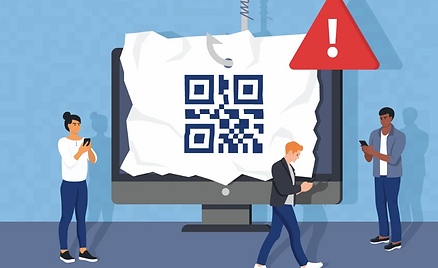ONLINE FRAUDS

QR CODE SCAM
The QR code scam tricks individuals into believing they’ll receive money, usually as advance for some product or service or refund for something. Instead, funds are deducted with the public none the wiser. The fraudsters employ a mix of rushing you up or engaging you in conversation while you scan the QR code. We emphasise, when dealing with QR codes online – pls check and recheck both the amount and the direction (incoming or outgoing) of the transaction. Staying alert and informed is crucial to prevent falling victim to such cyber scams.

CUSTOMS SCAM
You get a call from the police station saying that customs have intercepted a delivery against your name and the shipment contains drugs/ contrabands. The scam capitalises on your panic and confusion and the fake police office setup lends credibility for you to transfer money to close the case. It is kind of an extortion scam. The key here is not to panic and not resorting to calls for bribes from the actor.

SCREEN SHARING FRAUD
Fraudsters trick the customer to download a screen-sharing or remote access app. Certain app links, masked to appear like the existing apps of authorised entities, may be circulated through SMS, email, social media, Instant Messenger, etc. Fraudsters trick the customer to click on such links which results in downloading of unknown / unverified apps on the customer’s mobile, laptop, desktop, etc. Using such an app, the fraudsters can control the customer’s mobile / laptop and gain access to the financial credentials of the customer. Once the malicious application is downloaded, the fraudster gains complete access to the customer’s device and may access all apps on your phone, including your banking apps. Fraudsters then carry out unauthorised transfer of funds or make payments using the customer’s Internet banking/payment apps.

INSURANCE SCAM
The caller informs you of some lapsed insurance policy, which you were not aware of. They inform you that by making a payment of some amount to renew the policy, you can gain much more on its redemption. The prospects of higher rewards and the confusion regarding your previous investments are the key factors behind the success of this fraud. DO Not fall into this trap! Insurance companies do not call customers about lapsed policies and they most certainly do not renew lapsed policies on phone. However, if you are really unsure, ask for the details of the lapsed policy. Then do the research yourself and visit the insurance company’s website and office to verify.

PHISHING
Phishing entails getting your personal and sensitive information without a genuine purpose. Fraudsters create a phishing website that appears to be a legitimate website, such as a bank's website, an e-commerce website, a search engine, and so on. Fraudsters distribute links to these websites by SMS, social media, email, and Instant Messenger, among other methods. Many clients click on the link without first checking the Uniform Resource Locator (URL) and enter sensitive personal information such as a Personal Identification Number (PIN), One Time Password (OTP), Password, and so on, which are collected and utilised by fraudsters. What is the way around this? Do not share your sensitive or personal information Most certainly do not share the account passwords, CVV, PIN etc on any website which doesn’t look genuine. How do we check the genuineness of these websites – check for the website address – it might be slightly different from your usual bank website. Another red flag is incorrect grammar, spelling mistakes etc on the websites.

EMERGENCY SCAM
This usually starts with you getting a call or social media message from a friend/ relative etc. who acts as if they are in real need of money. Victim is led to believe that they are sending funds to assist a friend or loved one in urgent need. Victim sends the money with urgency as the victim’s natural concern for a loved one is exploited. A variation of this is the grandparent scam. The victim is contacted by an individual pretending to be a grandchild in distress, or a person of authority such as a medical professional, law enforcement officer, or attorney. The fraudster describes an urgent situation or emergency (bail, medical expenses, emergency travel funds) involving the grandchild that requires a money transfer to be sent immediately. No emergency has occurred, and the victim who sent money to help their grandchild has lost their money. If you get such a message, please check with the friend/ relative yourself or their immediate family member whether they need help. Insist on video calling with the person or at least speaking to them. With AI and DeepFake, scamsters may even be able to clone the person’s voice to convince you. Hence, verify some personal details on the call before rushing to transfer money for help.
We talked about the need to be satark (vigilant) while undertaking financial transactions. While scamsters keep reinventing ways to swindle us of our hard-earned money. However, there are some modes that these scamsters keep employing very frequently. Below we describe some of the more common frauds so that we can make ourselves fraud-proof.